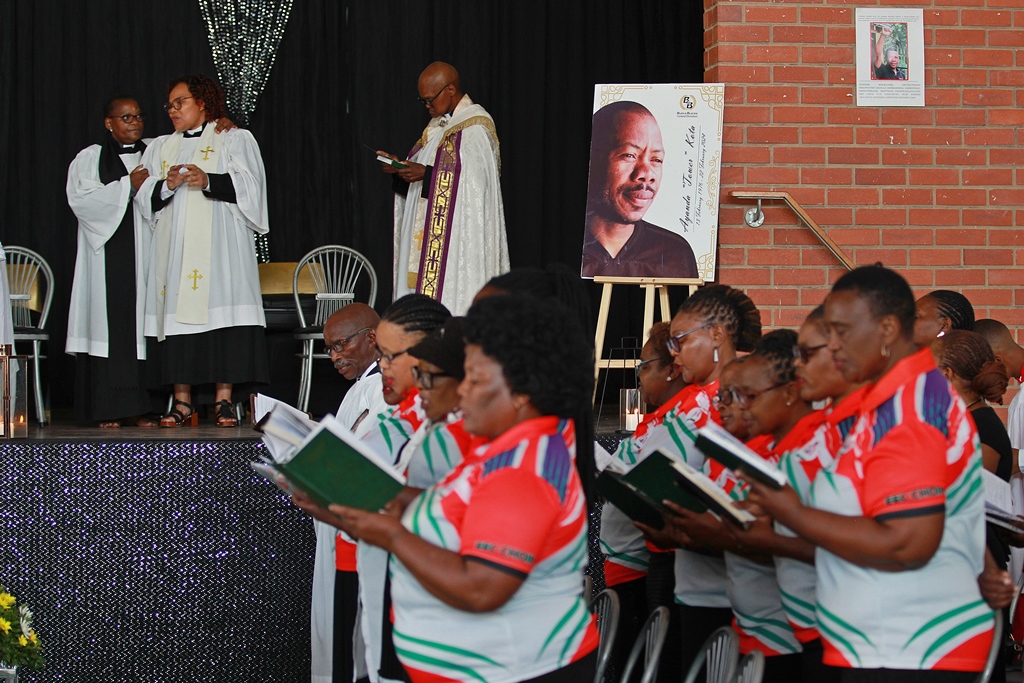Steven Lang
A large image of the late Ayanda Kota looking out over mourners greeted new arrivals as they entered the hall of the Indoor Sports Centre in Joza on Saturday morning. His casket was in the centre of the hall during the moving funeral service that began at 9 am and concluded just after lunchtime.
His photograph on stage showed a benign Ayanda Kota looking over those who had come to lament his passing as if he were still there, watching over and protecting his soldiers who fought shoulder-to-shoulder against inequality, capitalism and the patriarchy.
Likhaya Ngandi was the master of ceremonies in the funeral service held under the auspices of the Ethiopian Episcopal Church. More than 650 people were in attendance.
There were two flows in the service that sometimes intermingled smoothly and other times veiled a barrier of discontent. The family and the church drove one stream, while the other was motivated by political dynamics. This duality emanates from the man himself, who often proclaimed, “I am a man of God,” and is best known for his political struggles.
In an attempt to avoid any unseemly clashes, the family specifically asked speakers not to pillory the ruling party in Makana. The request was not as simple as it might appear, as Kota himself regularly heaped scorn on the ANC.
Speaking for Kota’s family, Mandisa Maxhegwana began with an apology, reminding those present that she might not always choose the right words because she was not used to public speaking. She said it was difficult for her because she was standing on the shoulders of a giant who carried so much for others, yet he never complained. She explained that “Ayanda was not only our brother, but was for Grahamstown people. Ayanda was a true leader”.
She said he had the energy to organise, the eloquence to communicate, the necessary patience, the ability to execute a plan and the wisdom to evaluate difficult situations.
*[1] Reflecting on their shared childhood, Maxhegwana explained that the Kota and Maxhegwana surnames are the same and that the children from both surnames were raised as one and grew up in house number 39D. “I learned at home there’s no cousin. It’s a brother and a sister,” she adds.
Several speakers stressed the importance of ‘unity’ in families, community and politics. Maxhegwana emphasised the unity within their family and made special mention of how Kota’s partner, Babalwa, worked hard to look after him and their children.
**[2] Maxhegwana added that Kota received a lot of threats due to his role in the political struggle, which, she says, led to his untimely death.
**[2] “My uncle was very sick. The threats didn’t work, the bullets didn’t work. It was someone close to him that got to him. We don’t know that person; only God knows…[they got to him, and he received numerous diagnoses including TB and cancer],” she said.
**[2] “They couldn’t see [the cause of the sickness]…but we as the family knew that he was poisoned, the poison got to him,”
Family squabbles can be divisive, but Kota’s children, Sibalwethu, Sima, Imithandazo, Molemo and the youngest, three-year-old Nosisa, were visibly unified in their grief, even if some were not old enough to understand the enormity of their father’s passing. The eldest son, Sibalwethu, had to marshal all his strength to address the ceremony as he was visibly shaken and had to be comforted several times when his emotions got the better of him.
The politics that sometimes made Kota a polarising character were all around at the funeral service in the form of large banners and a multitude of T-shirts carrying political messages. The Cry of the X-cluded demanded, “Tax the rich” and “Stop budget cuts”. Other slogans read, “Unite and fight patriarchy, unemployment capitalism”; “Land is life, Land is dignity”; and “Women, guardians of LAND, LIFE, WATER, SEED and LOVE”.
A prominent banner argued that socialism means freedom, democracy and dignity, but perhaps the priest from the Ethiopian Church put it most succinctly when he said of Kota, “He appreciated the sense and centrality of the people in liberating themselves and believed in their agency to effect political and social change”.
Political messages were skilfully balanced when the Executive Mayor of Makana, Councillor Yandiswa Vara, was asked to speak as a political leader of the municipality. Kota frequently criticised her and her administration, but she deftly manoeuvred around the uncomfortable moment by acknowledging that while they had their differences, they always kept in mind their shared goal of improving the lot of the citizens of Makana.
Perhaps the most powerful message that both church and political leaders shared was that ‘the legacy lives on’. The man had passed, but his love for his family and his commitment to a just and equitable society live on.
Due to a translation error, Grocott’s Mail would like to make corrections to the originally published article and apologise for the misprint.
Corrections:
*[1] In the original article, we published that the Kota and Maxhegwana families grew up in different houses. However, they are one and the same surname, and the children from that family are brothers and sisters.
**[2] The misprint is interpreted as Kota’s partner, Babalwa, being the one who poisoned him; however, that is incorrect because, reportedly, his cause of death was cancer, though the family believes that he was poisoned by his political enemies because of his involvement in the political struggle.


